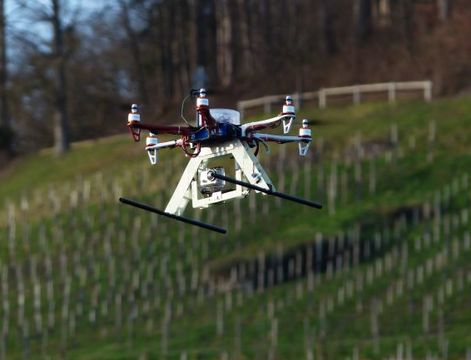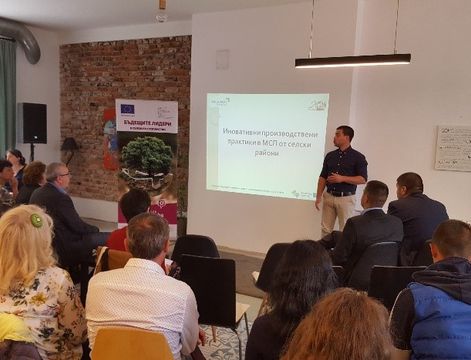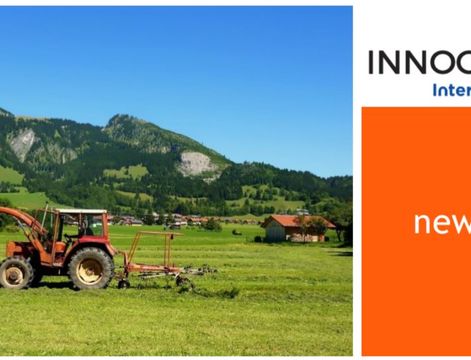
Workshop on National & EU financial instruments
The Lead Partner, (Region of Thessaly) will organise an online workshop on National & EU financial instruments within the scope of the 5th call activities.
REGIONAL SUPPORT TO ENGAGE RURAL ECONOMY SMES IN INNOVATION
Rural economy SMEs face challenges in adopting innovation to increase their competitiveness. Regional policies need to correspondingly support the diffusion of innovative solutions and new business models that will lead to increases in productivity and access to new markets. INNOGROW regions are called to play an important role in supporting the modernisation of their existing rural SMEs and the proliferation of innovative start-ups.
PROJECT OBJECTIVE
INNOGROW brings together 9 partners from 8 countries, involving the managing authorities & regional bodies influencing regional and national policy instruments, to exchange experiences & practices, and to improve their capacity on implementing policies that promote the adoption of technology and business model innovations by rural economy SMEs, to boost their competitiveness.
EXPECTED CHANGES
- Enhanced innovation support services for over 5% of rural economy SMEs in partners’ regions.
- Improved horizontal & vertical cooperation among SMEs in rural areas for products commercialisation.
- Increased capacity of 200 staff of public administrations to effectively implement policies, stimulating innovation adoption by rural economy SMEs.
- 10+Meuros of investments unlocked to promote innovative technologies & new business models.
MAIN OUTPUTS & BENEFITS
3 interregional workshops, 2 study visits & 1 EU regions summit to promote experiences exchanges of partners and stakeholders. 8 action plans to improve the addressed policy instruments, benefiting managing authorities and beneficiaries. 14 policy briefs to transfer INNOGROW lessons learnt to public authorities beyond the partnership. An online benchmarking tool for all EU territorial administrations, to facilitate optimisation of policy-making in the field of rural economy SMEs competiveness. 5 thematic studies & analyses on practices and measures that improve rural economy SMEs competitiveness.
€1,763,922.00
SME competitiveness
MAIN FEATURES
The ROP of Thessaly covers 10 thematic objectives. The 3rd objective focuses on SMEs competitiveness.
Investment priorities:
3(a) promoting entrepreneurship, in particular by facilitating the economic exploitation of new ideas and fostering the creation of new firms;
3(c) supporting the creation & extension of advanced capacities for product & service development;
3(d) supporting the capacity of SMEs to grow in regional, national and international markets, and to engage in innovation processes.
Most Thessalian SMEs operate in the agro-food sector. As a result, a number of interventions under TO3 are covered by EAFRD and Competitiveness, Entrepreneurship & Innovation OP. Still, the ROP of Thessaly recognises that measures to boost innovation for rural economy SMEs is a priority of developmental nature, where ERDF resources need to be directed. Accordingly, the ROP dedicates ERDF resources to actions for all SMEs of the sectors identified in RIS3, including SMEs of agro-food sector.
REASONS FOR IMPROVEMENT
SMEs in Thessaly are facing viability challenges, not only due to the outbreak of the financial crisis, but also due to the low integration of R&D results. To this end, the region of Thessaly acknowledges the need to develop innovation support services, so that SMEs can exploit new technologies and models to develop innovative products and access new markets. The ROP lacks such specific measures, which calls for improvement by the managing authority.
MAIN FEATURES
ROP of Lombardia has a clear focus: boost innovation in the areas of competitive advantage, such as agribusiness, including improvements on the competitiveness of the regional economy by supporting the capacity of SMEs. Specifically, the 3rd priority axis prescribes measures to promote the competiveness of SMEs operating in agribusiness. The most relevant to INNOGROW are listed under Investment Priorities 3b and 3d:
- Develop regional advisory services
- Support innovation in organisational and management models of regional SMEs
- Improving access to credit, business financing and risk management for start-ups operating in agriculture
- Promote the internationalisation and attractiveness of regional SMEs
- Support the networking of regional SMEs to increase competiveness
REASONS FOR IMPROVEMENT
Regione Lombardia has identified the following areas to improve:
- The monitoring, assessment, and benchmarking of regional rural economy SMEs' innovation performance have not been addressed, making difficult the evaluation of the impact of the policy instrument.
- The policy instrument does not elaborate on measures to address structural weaknesses in terms of supporting SMEs (e.g. development of innovation-centred advisory services).
MAIN FEATURES
In Latvia there is a single multi-fund operational programme aiming at achieving key national development priorities at regional and national level. OPGE provides significant support to economic growth and employment, with a particular focus on the competitiveness of Latvia's economy. 7.11% of OPGE resources are allocated to supporting the competitiveness and innovation of enterprises (priority axis 3), with emphasis on the specialisation areas depicted in RIS3, including organic and functional food.
Investment priority 3.2: Supporting the capacity of rural economy SMEs to engage in regional, national & international markets and innovation processes.
Specific objective 3.2.1: increase export percentage of high value added products.
Relevant measures: support for the introduction of rural economy SMEs in foreign markets, cooperation on local & international level, merger into clusters to increase innovation development & integration.
REASONS FOR IMPROVEMENT
Although modern equipment has been introduced, and advanced techniques for using fertilisers and chemicals are applied by the Latvian rural economy enterprises, this applies only to the large enterprises in the field, as depicted in national statistics. Thus, there is a need to improve OPGE to better involve small & medium enterprises to clusters & new business models, to ensure adequate production of goods of necessary volume to access new markets.
MAIN FEATURES
In Bulgaria, regional development is tackled by national operational programmes. OPIC aims at improving SMEs competitiveness of all sectors at local, regional and national level. OPIC’s priority axis 2 focuses on Entrepreneurship & capacity for growth of SMEs:
Specific objective "Strengthening productivity and export potential of Bulgarian SMEs"
Relevant measures:
a) Support the growth of enterprises by promoting the use of ICT and services.
b) Support the implementation of activities and services that benefit business development and SMEs’ export opportunities.
REASONS FOR IMPROVEMENT
As acknowledged by the beneficiaries of OPIC, the impact of OPIC measures on strengthening productivity and export potential of rural economy SMEs is limited compared to other sectors. There are two reasons for the limited participation of rural economy SMEs in OPIC’s calls:
a) Rural economy SMEs have less capacity in developing and submitting proposals, and thus standardised forms are needed to be developed for the relevant projects’ proposals.
b) SMEs established in municipalities that are listed as rural can apply to the rural development programme. However, rural economy SMEs established in municipalities such as Stara Zagora or Kazanlak, - not listed as rural, although most of SMEs are rural economy SMEs - could apply for funding only under OPIC. There is a need to improve the implementation of OPIC to better fit with the needs of rural economy SMEs.
MAIN FEATURES
The national OPEIC aims at achieving a competitive & sustainable economy at both national and regional level, based on knowledge and innovation, since there are no regional operational programmes in Czech Republic. OPEIC focuses on enhancing innovation and competitiveness of enterprises to increase their added value, stimulate growth and improve the performance of research & innovation systems.
Priority axis 2 refers to the development of business & competitiveness of SMEs. Relevant measures include:
- support for the implementation of business plans for start-up companies implementing lower-level innovations.
- consulting services for start-up provided by business incubators, science and technology parks, innovation centres.
- services for SMEs focused on international competitiveness, e.g. consulting services for strategic and innovation management, new development opportunities in foreign markets.
REASONS FOR IMPROVEMENT
OPEIC, as a national operational programme, does not fully address the challenges faced by SMEs in various regions & sectors as concerns the diffusion and adoption of innovation. INNOGROW will address the challenge of transferring R&D results into the rural economy, promoting collaborations between rural economy SMEs and universities, lifting this barrier in the Pardubice region. Receiving a regional perspective on OPEIC implementation will stimulate improvements to benefit all other regions in Czech Republic facing same challenges.
MAIN FEATURES
The ROP of Molise aims to increase SMEs competitiveness & strengthen research & innovation. The programme focuses on nine main priorities. 31% of total ERDF resources are allocated to the 3rd priority “Promote competitiveness of the productive system”, with a particular focus on the sectors identified in RIS3 of Molise region, including agribusiness. Molise is one of the Italy’s most rural regions.
In the context of INNOGROW, the relevant investment priority (3.d) is supporting the capacity of rural economy SMEs to grow in regional, national and international markets & to engage in innovation processes. The programme’s specific objective 3.4 is to improve access to finance, corporate finance & risk management for rural economy SMEs. The actions under this objective support investments for start-ups operating in Molise, with venture capital funds. Support will be provided at pre-seed, seed and early stage phases & will be focused on the reorientation of the production system, integrating innovative methods.
REASONS FOR IMPROVEMENT
Rural economy SMEs, especially start-ups, need to exploit new technologies fast to enter new markets and become dominant. Bureaucracy of procedures and low speed of evaluation and funding processes are the main issues faced by rural economy SMEs in Molise region. Therefore, project proposals’ evaluation and funding procedures under specific objective 3.4 have to be improved to achieve a further boost of the local rural economy.
MAIN FEATURES
In Slovenia, regional development and growth is addressed by national policy instruments instead of regional operational programmes. To this end, SIP focuses on improving Slovenian SMEs competitiveness at regional level. INNOGROW will address 3 measures of SIP:
No45 Supporting non-technological innovation to achieve value (IPRs, process & organisational innovation, new business models for internationalisation of companies).
No47 Promoting R&D activities and investments in priority technology and industrial areas in accordance with smart specialisation. Promoting connections between companies, research & consultancy organisations (horizontal & vertical integration covering the entire value chain, to accelerate commercialisation of new products). No50 Promoting business’ internationalisation. Connecting companies for joint entry to foreign markets, consulting on opportunities in foreign markets, international business networking.
REASONS FOR IMPROVEMENT
SIP, as a national operational programme, does not adequately address the challenges faced by SMEs in various regions and sectors. INNOGROW will address the issue of low level of internationalisation and biotechnology adoption by rural economy SMEs, which are challenges also faced by Gorenjska region, with the aim to improve the competitiveness of rural economy SMEs in Gorenjska and report back to the managing authority so that more regions that face same challenges will be benefited by SIP.
MAIN FEATURES
In Hungary, there are no regional operational programmes. The national TOP aims at supporting decentralised economic development and employment based on local resources. It focuses on creating local conditions to boost economic growth and increase employment. Priority 1A – “Promotion of companies’ capabilities through the creation of a business environment with the required local conditions” supports local governments on developing local business infrastructures and services to improve SMEs competitiveness. The actions supported under priority 1A involve the development of incubators, innovation centres and logistics centres. This also deals with local market development in rural areas, where local governments support rural economy SMEs via TOP, offering advanced services on post-production management of products, such as storage, cooling, sorting and packaging.
REASONS FOR IMPROVEMENT
In order to support rural economy SMEs to increase their competitiveness, a wider range of high-quality services need to be offered by local governments; neither the TOP foresees such measures, nor local initiatives have been put into place. While planning and building local business infrastructures, local governments have to first understand the needs of SMEs operating in their areas, and offer targeted services. This way, improvement to the TOP will enable a higher number of rural economy SMEs to be benefited by the policy instrument.

The Lead Partner, (Region of Thessaly) will organise an online workshop on National & EU financial instruments within the scope of the 5th call activities.

Kick-Off Meeting for the INNOGROW's new additional activities, under 5th call.

The University of Newcastle participated in an EC research and innovation workshop.

The Molise Chamber of Commerce in cooperation with EEN - Enterprise European Europe Network, organised a workshop on innovation as a lever for competitiveness.

On 7th November 2019, the Molise Chamber of Commerce organised a workshop within the scope of implementing its action plan.

The Molise Chamber of Commerce contributed to the organisation of an event focusing on the "Internationalization of SMEs in rural areas",in Campobasso, Italy.

SZREDA presented the INNOGROW project at a project meeting for leaders in agriculture under the Erasmus+ program

SZREDA video about the Action Plan to improve the Bulgarian Operational Programme “Innovations and Competitiveness” 2014-2020

Participation of SZREDA in awarding ceremony for innovative farms from Bulgaria within the framework of the campaign "Future Leaders in Agriculture"

Welcome to the sixth edition of Newsletter series of the INNOGROW project